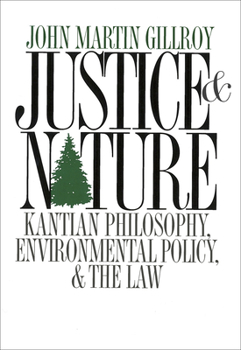Justice and Nature: Kantian Philosophy, Environmental Policy, and the Law
Most decision making in environmental policy today is based on the economic cost-benefit argument. Criticizing the shortcomings of the market paradigm, John Martin Gillroy proposes an alternative way to conceptualize and create environmental policy, one that allows for the protection of moral and ecological values in the face of economic demands. Drawing on Kantian definitions of who we are as citizens, how we act collectively, and what the proper role of the state is, Gillroy develops a philosophical justification for incorporating non-market values into public decision making. His new paradigm for justice toward nature integrates the intrinsic value of humanity and nature into the law. To test the feasibility of this new approach, Gillroy applies it to six cases: wilderness preservation, national wildlife refuges, not-in-my-backyard (NIMBY) siting dilemmas, comparative risk analysis, the Food and Drug Administration's risk regulation, and the National Environmental Policy Act. He also encourages others to adapt his framework to create alternative policy models from existing philosophies. This book offers new insights, models, and methods for policymakers and analysts and for scholars in philosophy, political theory, law, and environmental studies.
Format:Paperback
Language:English
ISBN:0878407960
ISBN13:9780878407965
Release Date:August 2001
Publisher:Georgetown University Press
Length:496 Pages
Weight:2.15 lbs.
Dimensions:1.2" x 6.8" x 10.0"
Grade Range:Postsecondary and higher
Customer Reviews
0 rating





